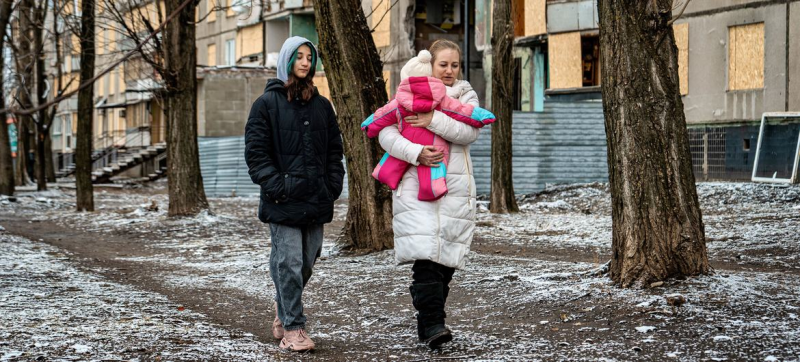- Logi-boitha of 2006 was the 1st reflection of Hasina’s fascism: Rizvi |
- Economists express concern over bank merger; BB remains confident |
- No response on request for Hasina’s extradition: Touhid Hossain |
- Deep relations with US, economic ties with China: Touhid |
- Recommendations on July Charter implementation submitted to CA |
Children suffer as winter nears amid strikes in Ukraine

A mother and her two daughters walk past damaged buildings in Kharkiv, Ukraine.
Airstrikes and ongoing conflict in Ukraine are leaving civilians – including thousands of children – without homes, power, water, and basic services, as humanitarians warn that the approaching winter is heightening risks for communities along the frontlines.
Dozens of civilian casualties were reported over the weekend and into Monday, with children among the injured, according to UN Spokesperson Stéphane Dujarric.
The hardest-hit areas include Dnipro, Donetsk, Kharkiv, Kherson, Kyiv, Sumy, and Zaporizhzhia.
“Meanwhile, our humanitarian colleagues tell us that evacuations of civilians continue from frontline communities in the Donetsk region,” Mr Dujarric told journalists in New York on Monday.
Between 24 and 26 October, more than 900 people were evacuated, he added, noting that the Ukraine Humanitarian Fund has released $13 million since May to support local and national NGOs in the Kharkiv region, aiding nearly 76,000 residents.
Roughly half of those reached are women and girls. Assistance has included cash transfers, shelter, health services, water, sanitation, hygiene support, and measures to prevent gender-based violence.
‘You can’t see anything’
Winterisation – providing lifesaving aid to vulnerable populations to protect them from cold weather and harsh conditions – is a major concern, the UN Children’s Fund (UNICEF) warns.
Kenan Madi, Chief of Field Operations at UNICEF Ukraine, told UN News that families along the frontlines urgently need heating, warm clothing, and other essential supplies.
“The attacks on infrastructure are impacting basic services – from hospitals to water utilities to district heating – making everyday life extremely difficult for children,” he said.
“I just had a colleague who came back from Chernihiv,” he continued, adding, “The only thing he told me was, ‘It’s really dark — you can’t see anything.’ Some rural areas are in total blackout. That’s what children are living through in Ukraine right now.”
UN response
Amid these conditions, UN agencies continue their efforts to reach communities with aid. UNICEF provided access to safe drinking water for 300,000 people in September alone and more than three million nationwide so far this year.
Education remains disrupted: approximately 350,000 children in frontline regions attend school in person, while over 400,000 follow a blended schedule and around 280,000 continue fully online.
To mitigate these disruptions, the agency supports over 150 learning centres offering catch-up classes, social-emotional support, and safe learning spaces. It has also rehabilitated more than 100 schools and kindergartens since 2022, with 42 additional facilities under repair this year.
Mental health a priority
Mental health services are also a priority. Last month, UNICEF reached 16,000 children and 25,000 caregivers in frontline areas with psychosocial support, and more than 300,000 people have received mental health assistance throughout 2025.
Mr Madi highlighted the human toll, referring to the challenges faced by a mother of twins with autism.
“She deserves to get the help she needs, but this is not the story of one person alone. There are many households struggling with their daily lives. There are many stories on the front lines and, unfortunately, year after year it is becoming harder for people, especially children. This is something very worrying for us.”

